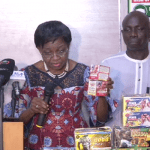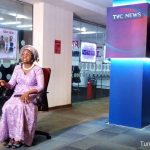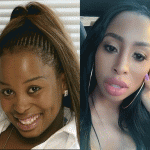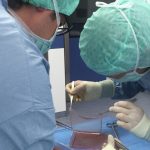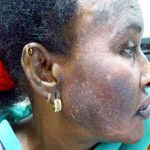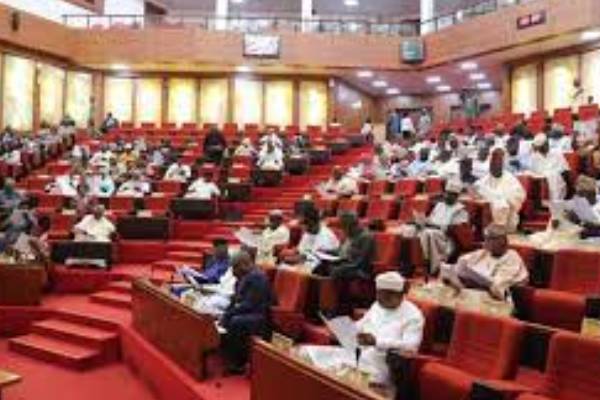The world health organization says that about seventy seven percent of Nigerian women use a skin lightening product making them the highest number of users in the world.
This increasing trend has now become a concern for the Nigerian government which is trying to bring an end to the trend through enforcement by the national agency for food and drug administration and control (NAFDAC.)
The agency has now kicked started efforts towards discouraging the use of unregistered and unapproved bleaching cosmetic products through a media sensitization workshop in Abuja.
In line with current trends, many Africans, especially women see skin lightening as a sign of beauty, wealth and achievement in life
An assessment published by the world health organization in 2011 states that at least four out of every ten women in Africa bleach their skin without knowing the irreversible side effects of these cosmetics.
Several African countries have banned skin lightening products but the laws are largely unenforced.
Due to the lack of enforcement skin whitening creams and soaps continue to flood the markets in several African countries like Ghana, South Africa, Mali and Nigeria.
Nigeria is now ready to enforce the ban on these products through steps that will be spear headed by the national agency for food and drug administration and control (NAFDAC).
They are starting with this media workshop with health journalists to enlist the fourth estate of the realm in informing the public about the dangers of using these highly toxic products without the proper knowledge.
The agency wants to tame the tide of the increasing use of these products through a campaign.
Nigerians have been encouraged to read labels properly so that they are aware of the harmful composition of anything they use on their bodies or take into their system.
A clampdown will be done on manufacturers and sellers of these products soon by the agency.
The world health organization says that about seventy seven percent of Nigerian women use a skin lightening product making them the highest number of users in the world.
This increasing trend has now become a concern for the Nigerian government which is trying to bring an end to the trend through enforcement by the national agency for food and drug administration and control (NAFDAC.)
The agency has now kicked started efforts towards discouraging the use of unregistered and unapproved bleaching cosmetic products through a media sensitization workshop in Abuja.
In line with current trends, many Africans, especially women see skin lightening as a sign of beauty, wealth and achievement in life
An assessment published by the world health organization in 2011 states that at least four out of every ten women in Africa bleach their skin without knowing the irreversible side effects of these cosmetics.
Several African countries have banned skin lightening products but the laws are largely unenforced.
Due to the lack of enforcement skin whitening creams and soaps continue to flood the markets in several African countries like Ghana, South Africa, Mali and Nigeria.
Nigeria is now ready to enforce the ban on these products through steps that will be spear headed by the national agency for food and drug administration and control (NAFDAC).
They are starting with this media workshop with health journalists to enlist the fourth estate of the realm in informing the public about the dangers of using these highly toxic products without the proper knowledge.
The agency wants to tame the tide of the increasing use of these products through a campaign.
Nigerians have been encouraged to read labels properly so that they are aware of the harmful composition of anything they use on their bodies or take into their system.
A clampdown will be done on manufacturers and sellers of these products soon by the agency.
The world health organization says that about seventy seven percent of Nigerian women use a skin lightening product making them the highest number of users in the world.
This increasing trend has now become a concern for the Nigerian government which is trying to bring an end to the trend through enforcement by the national agency for food and drug administration and control (NAFDAC.)
The agency has now kicked started efforts towards discouraging the use of unregistered and unapproved bleaching cosmetic products through a media sensitization workshop in Abuja.
In line with current trends, many Africans, especially women see skin lightening as a sign of beauty, wealth and achievement in life
An assessment published by the world health organization in 2011 states that at least four out of every ten women in Africa bleach their skin without knowing the irreversible side effects of these cosmetics.
Several African countries have banned skin lightening products but the laws are largely unenforced.
Due to the lack of enforcement skin whitening creams and soaps continue to flood the markets in several African countries like Ghana, South Africa, Mali and Nigeria.
Nigeria is now ready to enforce the ban on these products through steps that will be spear headed by the national agency for food and drug administration and control (NAFDAC).
They are starting with this media workshop with health journalists to enlist the fourth estate of the realm in informing the public about the dangers of using these highly toxic products without the proper knowledge.
The agency wants to tame the tide of the increasing use of these products through a campaign.
Nigerians have been encouraged to read labels properly so that they are aware of the harmful composition of anything they use on their bodies or take into their system.
A clampdown will be done on manufacturers and sellers of these products soon by the agency.
The world health organization says that about seventy seven percent of Nigerian women use a skin lightening product making them the highest number of users in the world.
This increasing trend has now become a concern for the Nigerian government which is trying to bring an end to the trend through enforcement by the national agency for food and drug administration and control (NAFDAC.)
The agency has now kicked started efforts towards discouraging the use of unregistered and unapproved bleaching cosmetic products through a media sensitization workshop in Abuja.
In line with current trends, many Africans, especially women see skin lightening as a sign of beauty, wealth and achievement in life
An assessment published by the world health organization in 2011 states that at least four out of every ten women in Africa bleach their skin without knowing the irreversible side effects of these cosmetics.
Several African countries have banned skin lightening products but the laws are largely unenforced.
Due to the lack of enforcement skin whitening creams and soaps continue to flood the markets in several African countries like Ghana, South Africa, Mali and Nigeria.
Nigeria is now ready to enforce the ban on these products through steps that will be spear headed by the national agency for food and drug administration and control (NAFDAC).
They are starting with this media workshop with health journalists to enlist the fourth estate of the realm in informing the public about the dangers of using these highly toxic products without the proper knowledge.
The agency wants to tame the tide of the increasing use of these products through a campaign.
Nigerians have been encouraged to read labels properly so that they are aware of the harmful composition of anything they use on their bodies or take into their system.
A clampdown will be done on manufacturers and sellers of these products soon by the agency.
The world health organization says that about seventy seven percent of Nigerian women use a skin lightening product making them the highest number of users in the world.
This increasing trend has now become a concern for the Nigerian government which is trying to bring an end to the trend through enforcement by the national agency for food and drug administration and control (NAFDAC.)
The agency has now kicked started efforts towards discouraging the use of unregistered and unapproved bleaching cosmetic products through a media sensitization workshop in Abuja.
In line with current trends, many Africans, especially women see skin lightening as a sign of beauty, wealth and achievement in life
An assessment published by the world health organization in 2011 states that at least four out of every ten women in Africa bleach their skin without knowing the irreversible side effects of these cosmetics.
Several African countries have banned skin lightening products but the laws are largely unenforced.
Due to the lack of enforcement skin whitening creams and soaps continue to flood the markets in several African countries like Ghana, South Africa, Mali and Nigeria.
Nigeria is now ready to enforce the ban on these products through steps that will be spear headed by the national agency for food and drug administration and control (NAFDAC).
They are starting with this media workshop with health journalists to enlist the fourth estate of the realm in informing the public about the dangers of using these highly toxic products without the proper knowledge.
The agency wants to tame the tide of the increasing use of these products through a campaign.
Nigerians have been encouraged to read labels properly so that they are aware of the harmful composition of anything they use on their bodies or take into their system.
A clampdown will be done on manufacturers and sellers of these products soon by the agency.
The world health organization says that about seventy seven percent of Nigerian women use a skin lightening product making them the highest number of users in the world.
This increasing trend has now become a concern for the Nigerian government which is trying to bring an end to the trend through enforcement by the national agency for food and drug administration and control (NAFDAC.)
The agency has now kicked started efforts towards discouraging the use of unregistered and unapproved bleaching cosmetic products through a media sensitization workshop in Abuja.
In line with current trends, many Africans, especially women see skin lightening as a sign of beauty, wealth and achievement in life
An assessment published by the world health organization in 2011 states that at least four out of every ten women in Africa bleach their skin without knowing the irreversible side effects of these cosmetics.
Several African countries have banned skin lightening products but the laws are largely unenforced.
Due to the lack of enforcement skin whitening creams and soaps continue to flood the markets in several African countries like Ghana, South Africa, Mali and Nigeria.
Nigeria is now ready to enforce the ban on these products through steps that will be spear headed by the national agency for food and drug administration and control (NAFDAC).
They are starting with this media workshop with health journalists to enlist the fourth estate of the realm in informing the public about the dangers of using these highly toxic products without the proper knowledge.
The agency wants to tame the tide of the increasing use of these products through a campaign.
Nigerians have been encouraged to read labels properly so that they are aware of the harmful composition of anything they use on their bodies or take into their system.
A clampdown will be done on manufacturers and sellers of these products soon by the agency.
The world health organization says that about seventy seven percent of Nigerian women use a skin lightening product making them the highest number of users in the world.
This increasing trend has now become a concern for the Nigerian government which is trying to bring an end to the trend through enforcement by the national agency for food and drug administration and control (NAFDAC.)
The agency has now kicked started efforts towards discouraging the use of unregistered and unapproved bleaching cosmetic products through a media sensitization workshop in Abuja.
In line with current trends, many Africans, especially women see skin lightening as a sign of beauty, wealth and achievement in life
An assessment published by the world health organization in 2011 states that at least four out of every ten women in Africa bleach their skin without knowing the irreversible side effects of these cosmetics.
Several African countries have banned skin lightening products but the laws are largely unenforced.
Due to the lack of enforcement skin whitening creams and soaps continue to flood the markets in several African countries like Ghana, South Africa, Mali and Nigeria.
Nigeria is now ready to enforce the ban on these products through steps that will be spear headed by the national agency for food and drug administration and control (NAFDAC).
They are starting with this media workshop with health journalists to enlist the fourth estate of the realm in informing the public about the dangers of using these highly toxic products without the proper knowledge.
The agency wants to tame the tide of the increasing use of these products through a campaign.
Nigerians have been encouraged to read labels properly so that they are aware of the harmful composition of anything they use on their bodies or take into their system.
A clampdown will be done on manufacturers and sellers of these products soon by the agency.
The world health organization says that about seventy seven percent of Nigerian women use a skin lightening product making them the highest number of users in the world.
This increasing trend has now become a concern for the Nigerian government which is trying to bring an end to the trend through enforcement by the national agency for food and drug administration and control (NAFDAC.)
The agency has now kicked started efforts towards discouraging the use of unregistered and unapproved bleaching cosmetic products through a media sensitization workshop in Abuja.
In line with current trends, many Africans, especially women see skin lightening as a sign of beauty, wealth and achievement in life
An assessment published by the world health organization in 2011 states that at least four out of every ten women in Africa bleach their skin without knowing the irreversible side effects of these cosmetics.
Several African countries have banned skin lightening products but the laws are largely unenforced.
Due to the lack of enforcement skin whitening creams and soaps continue to flood the markets in several African countries like Ghana, South Africa, Mali and Nigeria.
Nigeria is now ready to enforce the ban on these products through steps that will be spear headed by the national agency for food and drug administration and control (NAFDAC).
They are starting with this media workshop with health journalists to enlist the fourth estate of the realm in informing the public about the dangers of using these highly toxic products without the proper knowledge.
The agency wants to tame the tide of the increasing use of these products through a campaign.
Nigerians have been encouraged to read labels properly so that they are aware of the harmful composition of anything they use on their bodies or take into their system.
A clampdown will be done on manufacturers and sellers of these products soon by the agency.



